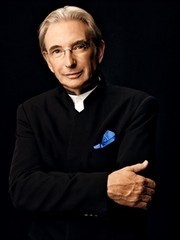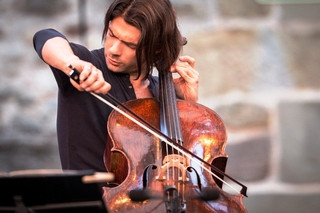|
Back
The Credo Did Rock New York
Isaac Stern Auditorium, Carnegie Hall
04/07/2017 -
John Cage: The Seasons
Dmitri Shostakovich: Cello Concerto No. 1 in E-flat Major, Opus 107
Béla Bartók: Concerto for Orchestra, sz. 116
Gautier Capuçon (Cello)
San Francisco Symphony, Michael Tilson Thomas (Conductor)

M. Tilson Thomas (© Art Streiber)
“If I ever crossed myself, it would signify ‘In the name of Nature, Art and Science’”
Béla Bartók (in a letter dated) 1907
That credo by the young Béla Bartók was never repealed. While Bartók’s life was replete with tragedies both personal and political, his music has always been clear, honest, homages to all three of these meta-religious beliefs. And even in the last year of his life, suffering illness and homesickness, his Concerto For Orchestra was a joyous lilt, a frothy–yet musically complex–picture of the great artist at work.
Which brings us happily to Michael Tilson Thomas. Happy is an understatement. Mr. Thomas, from his earliest years, was raised in the tradition of American music. His parents’ dinner table filled with the likes of Stravinsky and Cowell and Cage and Schoenberg. His own musical genius clearly in line with the greatest minds of post-war America.
Thus, his San Francisco Orchestra is a reflection not only of Mr. Thomas’ talents but of his openness, of his vivid pictorialism. Yes, his players are technically masters of their instruments. But in ensemble, their sounds are totally different from our–still–East Coast European ensembles. Our groups are stentorian, brilliant, they deliver us to their own heavens. The San Francisco Orchestra is more open, it has a singular transparency. At its best, even the great orchestral climaxes resemble a voluminous chamber group, every instrument enunciated, every texture glistening with terrestrial delight.
And nowhere was this better heard than the Bartók Concerto for Orchestra. Not that this work is ever anything but beguiling. Yes, the composer once called the end of the slow movement a “lugubrious death song”. But no more lugubrious than Mahler’s own First Symphony funeral march. His quotation from Shostakovich was in the best of spirits, his “game of twos” was blithe, and the end was a moto perpetuo in the best of spirits.
Exactly how Mr. Thomas took it. This is indeed a concerto for First Chairs, and his winds and brass gave it all they got, while the scurrying strings in the finale went without a hitch.
The mood throughout was never aggressive, but it was always forward, brash, razor-sharp and, at times, razor-cutting. No blood was shed, though. Bartók was the true believer, and in this case, his credo did rock.

G. Capuçon (© Gregory Batardon)
Bartók might have satirized Shostakovich, but the preceding Shostakovich First Cello Concerto was played with the most dynamic feeling by the great French cellist Gautier Capuçon. In a program like this, the Second concerto would have been out of place. Like Bartók’s work, that was written when the composer was dying. The Russian left his physical and mental agonies on his score: the Hungarian never let on to such trivial matters.
The First, though, is an ebullient piece. And from his very first notes, the transposition of the composer’s acronymic name, Mr. Capuçon proved brittle, passionate, almost wickedly assertive, as if he wanted to leap off the podium and hit us with his bow.
The middle was a change. The slow movement was as introspective as the other movements threw themselves at us. But Mr. Capuçon’s deft handling–especially the long cadenza–showed a young master at work. Yes, one always misses the Rostropovich renditions (Shostakovich dedicated both works to him), but Mr. Capuçon gave it an energy worthy of the master.
The opening of the concert was rare indeed. John Cage’s orchestration of his own The Seasons. Originally scored for piano, as a ballet for Merce Cunningham, The Seasons was Cage’s first work for orchestra. (And in that, he was judiciously helped by Virgil Thompson and Lou Harrison.) Its 15 minutes are gentle enough, flighty, they are pointillistically tender. One felt the snowdrops in winter, rainbow figurations in spring, and in the autumn–a time of destruction in the Indian calendar–he gave us a march which was never too serious.
One must make note of two splendid encores. Mr. Capuçon played a work which seemed familiar, but I couldn’t quite identify until returning home. This was Gregor Piatagorsky’s March For Solo Cello, in turn taken from the March from Prokofiev’s Children’s Pieces. It was amiable, tuneful, and played with Gallic élan.
Mr. Thomas’s encore was a massive work, and I pity those who left right after the last chords of the Bartók. This was The Alcotts, the third movement of Charles Ives’ Concord Sonata, orchestrated by Henry Brant.
Actually, could anybody orchestrate the Concord? Most would say no. But Mr. Brant gave the whole movement an Ivesian sense of Americana, a brassy Beethoven’s Fifth motive included. The same kind of American outdoorsy openness of this great great American orchestra.
Harry Rolnick
|